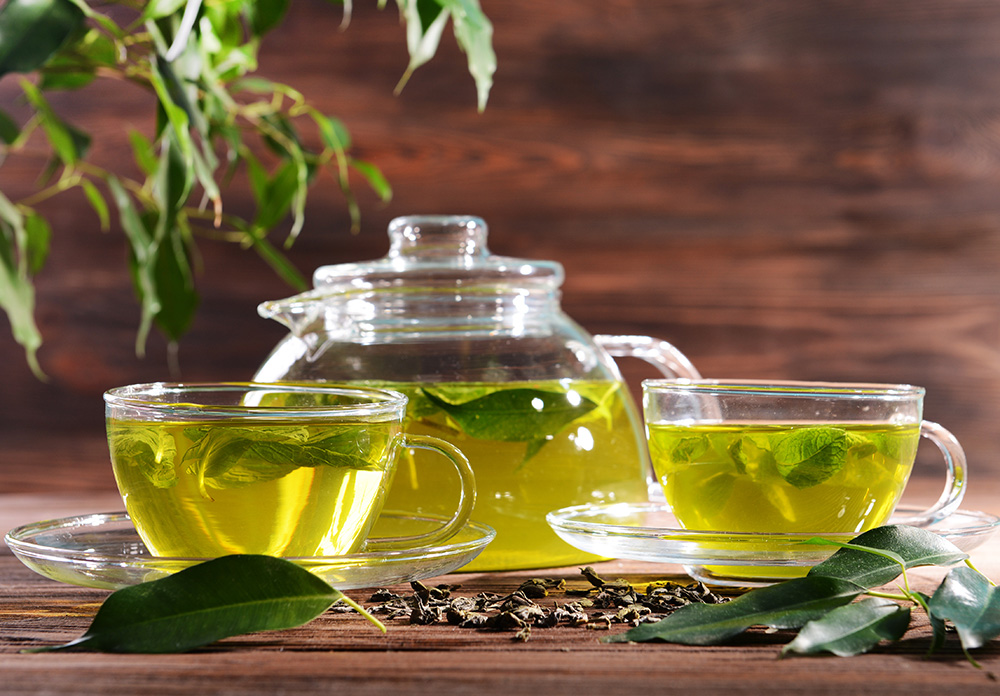THE BENEFIT OF GREEN TEA

New Parma / january-february 2009
Tea is one of the most popular drinks in the world, dating back to over 4,000 years ago. It is made from the leaves of the Camelia Thea Sinensis, a small evergreen plant characterised by its many branches and oblong elliptical dentate leaves.
Green tea is made of leaves dried immediately after the harvest, while black tea is made from leaves that have fermented before being dried with drafts of hot air and has a higher caffeine content than the former. The drying process deactivates the oxidising enzymes but leaves the anti-oxidising polyphenols untouched. These are the main ingredients of tea. 80% of the tea consumed in the world is black while 20% is green. Black tea is more popular in western countries while green tea is mainly consumed in Asia.
Polyphenols in tea are known as catechins and are also found in chocolate, red wine and apples. They are less concentrated in black tea because of the fermentation process.
Green tea is not just a powerful antioxidant, but may help prevent cancer, offers cardiovascular and cerebral benefits and helps weight loss.
Chen Zang, a famous Chinese pharmacist who lived during the Tang dynasty, declared “every medicine treats a particular disease but tea is the medicine that treats every disease”.
One of the most interesting developments in research in the last few years was the discovery of the extraordinary properties of green tea in fighting the effects of aging and cancer. It was found that the countries with the highest consumption of green tea (mainly China and Japan) have a lower percentage of people suffering from cancer. In Japan the women who teach the ceremony of tea (and consequently consume more tea than the average) are known for their longevity; cases of terminal cancer in this group are very rare.
The authors of a recent study have concluded that abundant daily consumption of green tea, about ten cups, may prolong life beyond the age of 80, but it may also prolong the life of younger people avoiding premature death especially from cancer.
An experiment conducted with 850 male smokers revealed that drinking two cups of tea a day reduces the incidence of lung cancer by 66%.
Drinking tea can also prevent skin cancer. In fact it reduces the production of melanin, limiting both its overproduction and the inflammatory reaction of skin to sun exposure. The caffeine contained in tea is responsible for stimulating the central nervous system which is reflected in an increase in powers of concentration and general psychological well being. This effect, however, is counterbalanced by the teanin that favours mental relaxation reducing anxiety and stress, without effecting mental capabilities adversely. Moreover green tea protects cerebral neurons and inhibits the disintegration of Acetylcholine, neurotransmitter which is necessary for memory and for the ability to learn, and which lacks in people affected by Alzheimer’s disease. As far as the cardiovascular system is concerned, green tea also seems to be able to lower cholesterol; a 8 year study of 1500 middle aged people revealed that those who drank over 60 cl. of green tea per day had a 65% lower risk of suffering from hypertension. A recent study conducted in the USA on 340 individuals who had had heart attacks has demonstrated that drinking at least one cup of green tea a day leads to a 50% reduction in the risk of suffering from another attack, compared to those who do not consume any.
There are further beneficial effects of green tea. In fact recently green tea was proposed as a key component of an effective weight loss diet. It has a thermogenic effect, meaning an increase in heat production by the body, consequently the body burns more calories. Moreover it increases the release of CCK – an intestinal hormone that reduces the appetite and empowers the adrenaline effect which is a fat-burning hormone – it inhibits gastric pancreatic lipase, meaning the enzymes responsible for digesting fat, and finally it inhibits the alfa-amylase, reducing the assimilation of carbohydrates.
How do you consume green tea?
Green tea can be consumed as a drink, or in capsules. The stimulating effect is maximised by short infusion. A prolonged infusion results in a bigger extraction of tannins which tend to bind with caffeine, and are therefore less absorbable by the body. To avoid the destruction of the active ingredients of green tea it is important to use hot water, approximately 80° Celsius, rather than boiling water, and then infuse between 1.5 and 2 minutes.
With so many benefits for health it would be wise if Italians, instead of cornetto and cappuccino, started to consider and appreciate this drink, a precious gift from nature.

